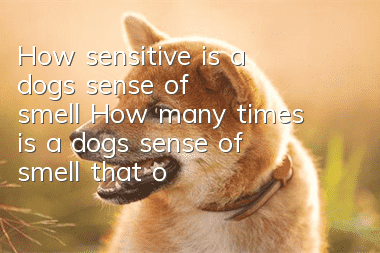How sensitive is a dog’s sense of smell? How many times is a dog’s sense of smell that of a human?

A dog's sense of smell occupies the most important position among its sensory abilities. The total number of olfactory cells in dogs is 40 to 100 times that of humans, and the overall olfactory sensitivity is 1 to 1 million times that of humans.
It is said. A trained dog can distinguish more than 100,000 odors. No wonder dogs are known as "animals that live by their noses."
Relevant research results show that humans have only 5 million olfactory cells, covering a small part of the upper mucosa of the nasal cavity, with an area of only about 5 square centimeters; while a dog’s nose has many wrinkles, so the surface area of its nose It has increased a lot. The number of olfactory cells in dogs is about 125-200 million, and some breeds have even more. For example, a kind of shepherd dog has 220 million olfactory cells. These olfactory cells occupy an area of the nasal cavity. Up to about 150 square centimeters. With so many olfactory cells, dogs can smell at least a million times better than us humans.
The dog's olfactory system is even developed to the point where it can "see" (smell) objects that ordinary people cannot see, and even hormones excreted by humans or other animals.
Dogs can then use this information to determine whether a potential mate is nearby, whether their human friend is pregnant or sick, and whether a particular creature is friendly or hostile.
The shape & structure of a dog’s nose
A dog’s nose looks like nothing in appearance, just black and yellow nose meat and two nostrils pointing upward. But this black nose is the first point of contact between dogs and the outside world. In addition to breathing air, there are many protrusions inside the hairless tip of the dog's nose, which is also the main part of their olfactory organ. Dogs have glands on their noses that secrete mucus.
- Why do dogs eat their own children?
- What causes vomiting in puppies? Owners cannot take it lightly!
- How to train a dog? How to train dog behavior!
- What’s wrong with dogs’ loose stools?
- Precautions for novices in feeding puppies, a must-read for every dog owner!
- Dangers of shaving dogs When can I shave my dog?
- How many days does it take for a dog to have its ears erect after being taped?
- Can dogs take cold medicine?
- The dog vomited a yellow lump
- How is dog dermatitis treated?



